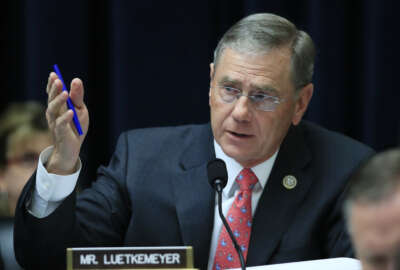The Small Business Administration recently implemented rules to expand its 7(a) small business loans program, but the agency’s inspector general and certain lawmakers have concerns about SBA’s ability to oversee the program and put controls in place to prevent fraud and abuse. These concerns largely stem from the agency’s handling of pandemic relief programs like the Paycheck Protection Program and the Economic Injury Disaster Loan, both of which were rife with fraudulent borrowers.
Of particular concern — especially to House Small Business Subcommittee on Oversight, Investigations, and Regulations Chairwoman Beth Van Duyne (R-Texas) — is the SBA’s decision not to pursue repayment on defaulted PPP and EIDL loans worth less than $100,000. On March 15, the House Small Business Committee sent a letter expressing these concerns and requesting documentation on how SBA arrived at this decision.
Van Duyne said during a subcommittee hearing on Tuesday that in its March 27 response, SBA said that collections on these loans was “not a cost-effective use of taxpayer resources.”
“SBA used historical data from the SBA Express Loan program, which they claim is the most analogous to PPP loans,” Van Duyne said. “SBA claims that because Treasury recovered only 0.28% of the Express loans referred for further collection, that collection on the exponentially greater outstanding PPE loan portfolio was futile.”
But Mike Ware, SBA’s inspector general, disagreed with SBA’s analysis.
“I actually don’t agree that it’s a fair comparison. I actually think it’s more like apples to oranges in that regard, relative to collection,” he said. “What they are comparing is not the only form of collection. It’s not the only collection efforts. There [are] more simple avenues such as Treasury offset, where Treasury offset works that any future government funds that could be a tax return — it could be anything — would be held to fulfill that debt to the government. And that’s not a difficult mechanism to deploy at all. On top of it, it would help in ensuring that folks who defaulted or didn’t pay for whatever reason — it may not have been fraud, just that they refused to pay — it would help that they don’t get access to future programs until they’re current.”
In September 2022, the SBA Office of Inspector General put out a report on SBA’s decision to cancel collections on these loans. The OIG did not find evidence that SBA assessed the costs to recover these debts, estimates on how much could be recovered, or that SBA made any efforts to collect these loans at all. Instead, SBA delegated these efforts to lenders, without creating internal controls to verify these lenders complied with the requirements.
Ware said these loans totaled $1.1 billion at the time of the report, and as of the hearing, were up to around $8 billion.
Ware also said he disagreed with a recent SBA decision to implement the same policy to not pursue collections on EIDL loans under $100,000, and that the SBA OIG currently has an ongoing review into this decision. Van Duyne noted that the EIDL loans that fit this criteria totals $71 billion, but that SBA has not identified the total number of loans in default or their overall amounts.
“I believe SBA should make every effort to collect and that there are pretty simple avenues to make an attempt to collect that money. And I believe it sends a terrible message relative to how seriously we take that,” Ware said.
Ware also said that there isn’t really a time limit on recovering these funds, like with most investigations.
“When we go after normal fraud — before the pandemic and stuff like this — I equate it to footprints in sand. So you have to move quickly in order to catch a bad actor or it’s gone. The evidence is gone,” he said. “What we have right now is footprints in cement, right? When we get to it, it’s found. As soon as we open that file, it’s found. All the records are there.”
Ware did acknowledge that there is some point of diminishing returns, where the cost to SBA to collect on the loans would be higher than the amount of money they might recover, but that he doesn’t think SBA has reached that point yet.
Budgetary concerns
Ware told the committee he doesn’t have an estimate on how much money the SBA OIG would be able to recover if it got the go-ahead to pursue those funds. But he did say SBA OIG, at current funding levels of more than $20 million, assists in recovering around $30 billion each year. He called that kind of return on investment “unprecedented.”
But the question of SBA OIG’s funding levels are currently up in the air. The President’s budget request would raise SBA OIG’s funding by 33% over last year, which Ware said showed confidence in his office’s ability to pursue fraudsters.
But Rep. Jared Golden (D-Maine) pointed out debt ceiling legislation or proposals to cap discretionary spending may hurt SBA OIG’s bottom line. Ware said that could severely hinder his office’s ability to recover further funds, especially with supplemental funding set to go away in 2024. Ware said he has a number of term investigators that would essentially disappear without further funding.
“If my office lost money … facing what’s happening with my term employees in 2024, I wouldn’t be able to provide the oversight,” he said.
Copyright
© 2024 Federal News Network. All rights reserved. This website is not intended for users located within the European Economic Area.

